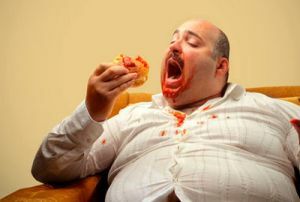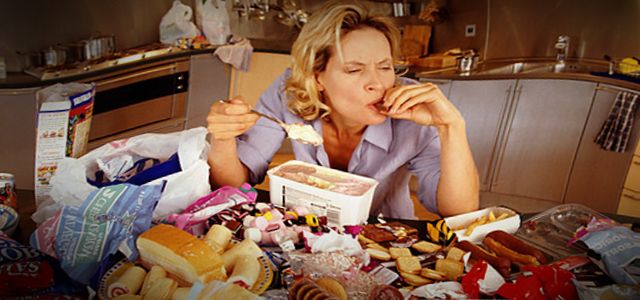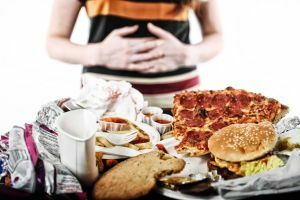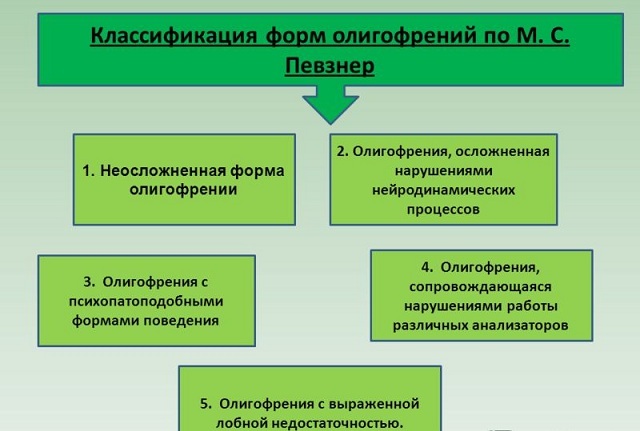 Compulsive overeating is characterized by eating disorders. Psychogenic state occurs against the background of a stressful situation and manifests itself in the use of a large amount of food without monitoring its actions.
Compulsive overeating is characterized by eating disorders. Psychogenic state occurs against the background of a stressful situation and manifests itself in the use of a large amount of food without monitoring its actions.
After an attack of gluttony, the patient feels shame and guilt, which leads to depression. Independently stop the occurrence of episodes of gluttony people usually can not, need the help of a psychiatrist and nutritionist.
Contents
- General description
- Reasons, factors and risk groups
- Genetic aspect
- View from within and from
- Diagnostic criteria
- What can I do?
- Consequences and preventive measures against relapse
General description
Psychogenic overeating acts as a protective reaction of the body to the emergence of a stressful situation. Emotional outbreaks can have multiple or single manifestations. In the first case, the problem arises from constant ridicule, mockery of the society, in the second situation, stress is related to divorce, dismissal or loss of a loved one.
Inability to express their emotions, fear of being rejected by people, leads to the replacement of inaccessible things with more food. Problems in the hypothalamus can increase the feeling of hunger, which further stimulates the development of the disease.

Causes, factors and risk groups
It is accepted to distinguish three types of factors that contribute to psychogenic overeating:
- Biological .The main criterion is heredity.
- Psychological is associated with a person's inability to cope with emotional changes.
- Social aspects of .Under the pressure of society in the modern world, a peculiar picture of ideality is laid. At full people from the inconsistency of the parameters there are complexes and aversion to one's own personality.
The risk group includes adolescents, complete people and people with mental disorders:
- In the childhood and adolescence , personality, character, and mental stability are formed. If a child has grown up in a dysfunctional family or has been paid little attention to, the habit of seizing an insult appears from an early age. At the same time,
 teenagers can complex during puberty due to the presence of acne, a small chest, a wide waist. Trying to cheer yourself up unconsciously instilled a habit of suppressing stress this way. Hormonal reorganization of the body can dull the sense of proportion, so saturation at the right time is not felt.
teenagers can complex during puberty due to the presence of acne, a small chest, a wide waist. Trying to cheer yourself up unconsciously instilled a habit of suppressing stress this way. Hormonal reorganization of the body can dull the sense of proportion, so saturation at the right time is not felt. - Full people also can suffer from childhood, when their peers ridiculed the imperfect figure from the school bench. Sometimes in the obesity lies the fault of the parents, if they as a reward give the child sweets, setting food a stimulus to achieve the goal.
- The psychological causes of can also become a provocateur factor for compulsive overeating, as they carry a depressive attitude. Such people are desperate in life, they are closed, not recognized and lonely. It is difficult for them to take criticism, and to open up to others the feeling of fear and the danger of being betrayed does not allow.
Genetic Aspect
Heredity plays an important role in the addiction to eating. Scientists have identified three genes that cause a tendency to overeating:
- GAD2 , which stimulates appetite;
- Taq1A1 reduces the level of dopamine, a hormone that is responsible for obtaining pleasure and satiety;
- FTO , the lower its concentration in the body, the more the amount of the hormone enhancing the feeling of hunger, while the feeling of saturation persists for a short time and the person again wants to eat.
A predilection for overeating can change genetic information and be transmitted to descendants by inheritance. This is because obesity and gluttony reduces the production of macrophages, which are responsible for the protective functions of the body.
A look inside and out of the
Overeating, as a psychological problem, arises spontaneously and with the loss of control over the situation. Most often this is not related to the feeling of hunger. After eating, a person feels guilty for what happened, he has depression. There are a number of symptoms, with at least 3 of which are diagnosed with compulsive overeating:
- people eat very quickly;
- consumes a significant amount of food without feeling saturated;
- food intake is not associated with a sense of hunger;
- prefers to eat alone, so as not to be ashamed of others;
- after eating a person feels guilty, is in a depressed state.
Such gluttony occurs with a certain periodicity, but at least once a week for 3 months. The episode includes the consumption of food for a certain period of time in an amount that a healthy person could not eat during the same period of time and being in the same circumstances.

Diagnostic criteria
The diagnosis is made after a careful analysis of the information received from the patient. The specialist is interested in the self-assessment of the  patient, what feelings arise during and after the attack, the presence of control over their actions during a meal, the duration of disturbances, the frequency and amount of food consumed, whether overeating is associated with the presence of stressful moments.
patient, what feelings arise during and after the attack, the presence of control over their actions during a meal, the duration of disturbances, the frequency and amount of food consumed, whether overeating is associated with the presence of stressful moments.
Since pathology can be the character of another disease, differential diagnosis of the disease is necessarily carried out. Eliminating bulimia allows the presence of feelings of guilt after overeating. With bulimia, a person causes vomiting or displays excess food with the help of laxatives. Obesity, in turn, does not cause depression after eating. Bad mood and mental disorders in this case are associated only with the presence of extra pounds.
What can I do?
Therapy should include an integrated approach to solving the problem. You need to fight both with psychological and physiological factors. In the beginning it is important to learn how to control one's behavior and actions. This can help a psychiatrist and a psychotherapist.
If there is no possibility to visit a doctor, then you can try to deal with the problem yourself, so people with a diagnosis of compulsive overeating need to follow a number of rules:
- should learn to be distracted from food, any hobby will help;
- food intake in the allotted hours;
- eat at least 5-6 times a day in small portions;
- make an adjustment to the diet, replacing high-calorie foods for fruits, sour-milk products, vegetables;
- instead of sugar, you can use a natural substitute based on stevia;
- to count calories, it will help to cope with excess weight;
- to go in for sports;
- to realize the need for treatment.

If you can not cope with compulsive overeating yourself, contacting a specialist becomes an integral part of the treatment. The psychotherapeutic part includes the implementation of methods of psychological correction.
Using the cognitive-behavioral model, the doctor helps the patient to form the right eating habits and teaches correctly to deal with excess weight. At the reception, you can learn how to learn to control yourself during another binge eating disorder.
Individual classes can alternate with group meetings where a person can get support from people with similar problems.
If there are problems in the family or at work, the chosen aspects are worked out. Treatment helps a person get rid of depressive settings, learn to perceive things without aggression and emotional negativity. Ability to control their emotions reduces the number of attacks.

Drug therapy includes taking medications that affect the mental state of the patient. Antidepressants and anti-obesity drugs may be used, but the use of the latter is controversial, since after the withdrawal of the remedy, the weight lost is returned again. The main treatment is aimed at eliminating the consequences of binge eating.
The assistance of a nutritionist is to teach the patient the proper nutrition and control of the daily diet.
Consequences and preventive measures against relapse
Complications of psychogenic overeating include disorders in the functioning of internal organs. Due to a malfunction in the operating mode as a result of uncontrolled food intake, the digestive system does not cope with its functions. And as a consequence, the absorption of vitamins and microelements is deteriorating.
With insufficient nutrition of tissues they are depleted, there are avitaminosis, anemia. The patient's condition worsens the condition of the hair, nails, teeth and skin. The risk of gastrointestinal, cardiovascular pathologies, violations in the work of the musculoskeletal  apparatus, endocrine disorders is increasing.
apparatus, endocrine disorders is increasing.
Rapid weight gain and obesity can be observed. Hormonal failures are often observed, which leads to the development of diseases of the urogenital system.
In order to prevent the development of the disease or to avoid relapse after treatment, it is necessary to observe a number of simple rules:
- is necessary 5-6 times a day, portions should be small so that after a meal there is a slight feeling of hunger;
- should be limited, and it is better to exclude, sweet, salty, spicy, fatty dishes;
- should comply with the drinking regime, but it is better not to use tea and drinks, but purified water;
- every morning should begin with the performance of standard gymnastic exercises, running;
- should not focus on eating, in a day you need to eat a limited amount of calories, which is necessary for the life of the body, monitor the situation helps to personal diary.
Compulsive overeating refers to serious eating disorders. Having this problem, you should not shut yourself up and feel hatred for yourself and your body. To get rid of the disease you need to undergo a course of medical and psychological correction, which will help to return to normal life.



